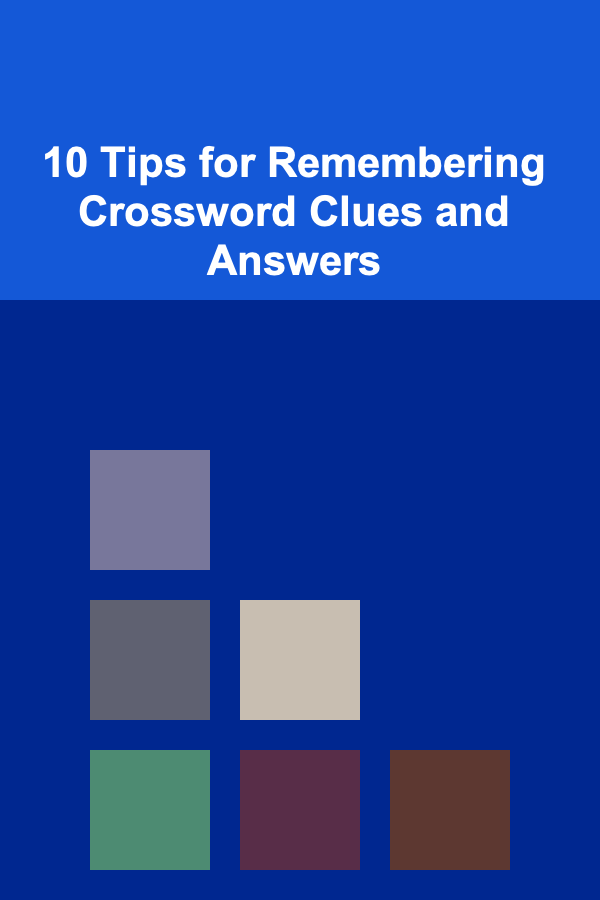
10 Tips for Remembering Crossword Clues and Answers
ebook include PDF & Audio bundle (Micro Guide)
$12.99$9.99
Limited Time Offer! Order within the next:

Crossword puzzles are a fantastic way to engage your brain, boost your vocabulary, and provide a fun challenge. However, one of the most frustrating aspects of solving crosswords is forgetting answers or struggling to recall a specific clue. Whether you're a seasoned crossword enthusiast or a beginner, improving your ability to remember clues and answers can significantly enhance your puzzle-solving experience. Here are 10 tips to help you sharpen your memory and improve your crossword-solving skills.
Start with the Easy Clues First
When you're faced with a crossword puzzle, it can be tempting to try to tackle the hardest clues right away. However, this can often lead to frustration, especially if you're stuck on a clue. Instead, start by working on the easier clues that you can solve with certainty.
Why It's Important:
- Build Momentum: Starting with easier clues helps you build confidence and momentum as you fill in more answers.
- Cross-Referencing: Solving easier clues can give you letters for the more difficult ones, making them easier to solve.
How to Do It:
Scan the puzzle for shorter words or clues that seem straightforward. Look for clues that reference common knowledge or are simple definitions. By filling in these answers, you'll gradually unlock more of the puzzle.
Focus on Word Patterns
Crossword puzzles often involve recurring patterns, such as letter combinations or word endings. Many answers share similar structures, and being able to recognize these patterns can significantly improve your ability to remember answers.
Why It's Important:
- Efficient Problem-Solving: Recognizing word patterns helps you identify likely answers without having to guess.
- Faster Recall: Familiar patterns or common suffixes/prefixes can trigger your memory, making it easier to recall answers.
How to Do It:
Pay attention to common word endings like "-ing," "-ed," "-ly," and "-ment." For example, if you're working on a clue about a verb and you already know the length of the answer, you can guess a possible word like "running" or "jumping" based on your knowledge of the puzzle's pattern.
Use Crossword Solver Tools Sparingly
Crossword solver tools can be incredibly helpful in moments of frustration, but over-relying on them can hinder your progress in the long term. It's best to use them as a last resort after trying your best to solve the puzzle manually.
Why It's Important:
- Memory Retention: Relying too much on solver tools prevents you from exercising your brain and retaining information.
- Problem-Solving Skills: By attempting to solve the puzzle yourself, you'll improve your ability to think critically and recognize patterns.
How to Do It:
If you've tried multiple ways to solve a clue and you're stuck, look up the answer on a crossword solver. However, take note of the solution so that you can learn from it for future puzzles.
Break Down Clues into Components
Crossword clues can be tricky, but often they contain more than one piece of information. Breaking down the clue into smaller parts can help you understand its meaning and lead to a more accurate answer.
Why It's Important:
- Contextual Clues: Some crossword clues are wordplay-based, requiring you to break the clue down into definitions, synonyms, or even homophones.
- Enhances Interpretation: By analyzing each part of the clue, you may uncover hidden meanings or alternative interpretations.
How to Do It:
If you come across a cryptic clue, break it down by looking for synonyms, homophones, or double meanings. For example, the clue "island getaway" might be asking for an answer like "trip," since it's a playful way of suggesting a vacation (which involves getting away to an island).
Visualize the Clue in Your Mind
Sometimes, simply visualizing the clue can help you recall the answer. Crosswords often involve a lot of word associations, and the more you visualize the connection between the clue and the answer, the more likely you are to remember it.
Why It's Important:
- Memory Activation: Visualizing answers taps into the brain's spatial and memory systems, making it easier to remember words.
- Stronger Associations: When you associate a word with a mental image, it's easier to recall that word later.
How to Do It:
Try to imagine a scene or image related to the clue. For instance, if the clue is "apple variety," visualize the different types of apples (e.g., "Granny Smith," "Fuji," etc.) to help you remember the correct answer.
Practice Regularly
Crossword puzzles, like any skill, improve with practice. The more you engage with them, the better you'll become at recognizing clues, patterns, and word associations. Consistent practice helps you retain information and make connections between words and their meanings.
Why It's Important:
- Builds Familiarity: Regular practice exposes you to common crossword clues and their answers, which helps you recall them more easily.
- Improves Memory: Repeated exposure to crossword clues and solutions strengthens your memory, making it easier to remember future answers.
How to Do It:
Set aside time each day or week to complete crossword puzzles. Start with easier puzzles and gradually work your way up to more difficult ones. Over time, you'll notice your ability to remember answers improving.
Use Mnemonics and Word Associations
Creating mnemonic devices or word associations is a great way to improve your memory of crossword clues. Associating answers with something familiar or creating a mental shortcut can make it easier to recall answers when you're solving a puzzle.
Why It's Important:
- Memory Aids: Mnemonics and associations act as mental triggers, helping you remember difficult or obscure answers.
- Faster Recall: Associating a clue with something familiar allows you to quickly retrieve the answer when needed.
How to Do It:
If you need to remember a tricky answer, create a short mnemonic or association. For example, for the answer "Eiffel" (in reference to the Eiffel Tower), you could create the association "Eiffel sounds like 'I fell'," linking it to the tower's iconic status. These creative memory aids can work wonders when you're stumped on a tricky clue.
Use the Crossword Grid to Your Advantage
The grid itself can be a helpful tool when you're solving a crossword. Often, the intersecting words provide clues that can help you remember answers. By working on both across and down clues simultaneously, you increase the chances of filling in more answers, which can help trigger your memory for others.
Why It's Important:
- Cross-Referencing: Intersecting clues give you more context, making it easier to guess or remember words.
- Memory Reinforcement: The grid helps reinforce connections between answers and clues, improving your memory of them.
How to Do It:
Work on the puzzle by alternating between across and down clues. As you fill in letters, you'll see how answers from other clues help you remember or deduce possible solutions. The more letters you have filled in, the easier it becomes to solve the remaining clues.
Keep a Crossword Puzzle Journal
If you solve crossword puzzles regularly, consider keeping a journal to track your progress. In this journal, you can write down clues that stumped you or answers that you found difficult to recall. Reviewing these notes periodically will reinforce your memory.
Why It's Important:
- Learning from Mistakes: Keeping track of the clues you struggled with will help you recognize patterns and better remember them next time.
- Reviewing Past Puzzles: Revisiting old puzzles allows you to see how much you've improved and gives you a chance to relearn difficult answers.
How to Do It:
After completing a crossword puzzle, take a few minutes to note down any answers or clues that were difficult for you to recall. Over time, this will help you become more familiar with recurring words or tricky crossword conventions.
Don't Be Afraid to Take Breaks
Sometimes, the best way to remember a crossword answer is to step away from the puzzle for a while. Taking breaks helps your mind reset and may allow you to approach the puzzle with a fresh perspective.
Why It's Important:
- Avoids Mental Fatigue: Working too long on a crossword puzzle can lead to burnout, making it harder to recall answers.
- Restores Focus: Taking a break helps your brain consolidate information, leading to better memory retention.
How to Do It:
If you find yourself stuck on a particular clue, take a short break. Go for a walk, stretch, or do something else entirely. When you return to the puzzle, you may find that the answer comes to you more easily.
By applying these 10 tips, you'll enhance your ability to remember crossword clues and answers, making your puzzle-solving experience more enjoyable and rewarding. Whether you're working on a simple crossword or a challenging cryptic puzzle, these strategies will help you boost your memory, improve your problem-solving skills, and become a more effective crossword solver over time.
Reading More From Our Other Websites
- [Home Budget 101] How to Save Money on Electricity: Budget-Friendly Tips for Your Home
- [Organization Tip 101] How to Track Your Expenses Effectively
- [Organization Tip 101] Why You Need to Set Goals for Home Organization Projects
- [Organization Tip 101] How to Use Fabric Bins for Stylish Storage
- [Scrapbooking Tip 101] DIY Stamp Sets: How to Make Your Own Custom Scrapbooking Stamps at Home
- [Home Renovating 101] How to Design and Organize the Perfect Walk-in Closet for Any Space
- [Home Security 101] How to Lock Up Valuables and Protect Your Property
- [Home Party Planning 101] How to Organize a Potluck Party at Home
- [Organization Tip 101] How to Organize Outdoor Furniture for Seasonal Use
- [Organization Tip 101] How to Keep Your Utensils from Getting Messy

Becoming a Successful Health Coach: Essential Skills for Client-Centered Success
Read More
How to Master Coffee Shop Customer Service
Read More
How to Use Clear Labels for Easier Inventory Management
Read More
How to Understand Ocean Acidification's Impact
Read More
How to Prune Roses for Maximum Blooms
Read More
How to Build a Cleaning Schedule Planner for Pet Owners
Read MoreOther Products

Becoming a Successful Health Coach: Essential Skills for Client-Centered Success
Read More
How to Master Coffee Shop Customer Service
Read More
How to Use Clear Labels for Easier Inventory Management
Read More
How to Understand Ocean Acidification's Impact
Read More
How to Prune Roses for Maximum Blooms
Read More